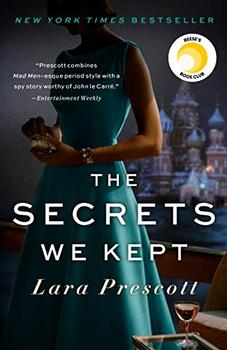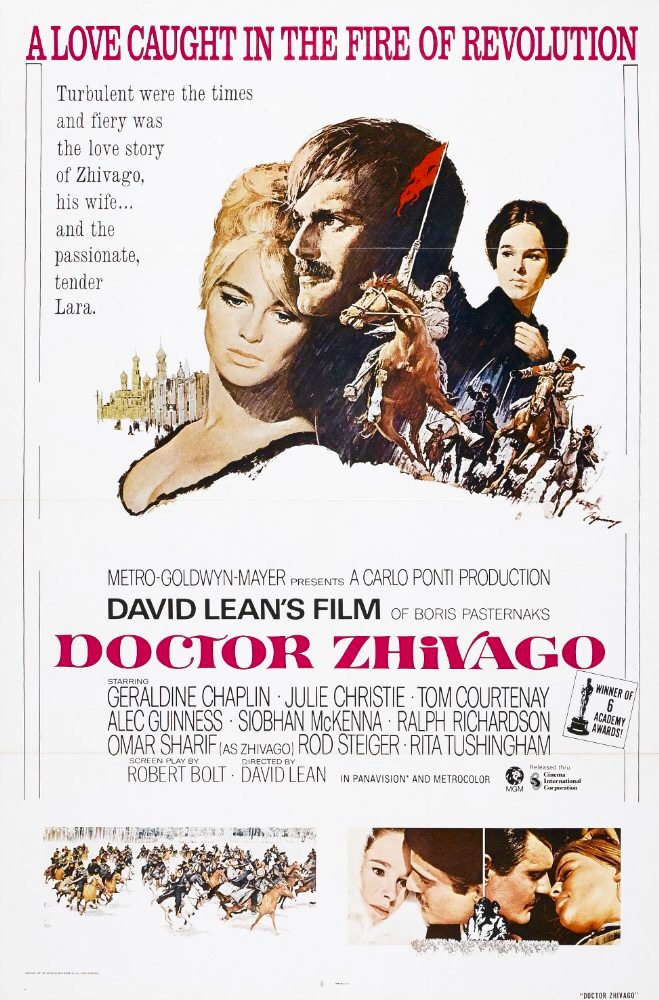Summary | Excerpt | Reading Guide | Reviews | Beyond the Book | Read-Alikes | Genres & Themes | Author Bio

A novel
by Lara PrescottThis article relates to The Secrets We Kept
 The Secrets We Kept by Lara Prescott revolves around the publication of Boris Pasternak's 1957 novel Dr. Zhivago, which was banned in the Soviet Union because of the author's perceived anti-socialist ideals. The novel was adapted into a film in 1965 by British director David Lean (famous at the time for Lawrence of Arabia), starring Omar Sharif as the title character and Julie Christie as his love interest Lara Antipova. Dr. Yuri Zhivago grows up wishing to be a poet, but becomes a doctor instead. He marries his cousin Tonya, but falls in love with another woman, Lara, who is married to a Bolshevik activist, Pasha Antipov. Drama and tragedy ensues, against the backdrop of the Russian Revolution. Though it was panned by many critics at the time of release, Dr. Zhivago is now widely regarded as one of the greatest movies ever made.
The Secrets We Kept by Lara Prescott revolves around the publication of Boris Pasternak's 1957 novel Dr. Zhivago, which was banned in the Soviet Union because of the author's perceived anti-socialist ideals. The novel was adapted into a film in 1965 by British director David Lean (famous at the time for Lawrence of Arabia), starring Omar Sharif as the title character and Julie Christie as his love interest Lara Antipova. Dr. Yuri Zhivago grows up wishing to be a poet, but becomes a doctor instead. He marries his cousin Tonya, but falls in love with another woman, Lara, who is married to a Bolshevik activist, Pasha Antipov. Drama and tragedy ensues, against the backdrop of the Russian Revolution. Though it was panned by many critics at the time of release, Dr. Zhivago is now widely regarded as one of the greatest movies ever made.
The Soviet Union would obviously not permit Lean to shoot the movie on location, so most of Dr. Zhivago was filmed in Spain on a massive set designed to resemble Moscow. Lean was a perfectionist, and the movie ended up having a three-and-a-half hour runtime, so the filming itself took almost a year and cost between $11-15 million. It was worth the money, as it made over $111 million in the U.S. alone and remains the 8th highest grossing film of all time. Though the critics were unimpressed, declaring it a "grievous disappointment" and "honest failure," audiences came out in droves to see Dr. Zhivago, and it went on to win five Academy Awards - Best Art Direction, Cinematography, Adapted Screenplay, Costume Design and Original Score. It was nominated for Best Picture, but that award went to The Sound of Music. The film did win Best Picture at the Golden Globes, and also snagged a Best Actor award for Sharif. It has been widely reported that all of the lead actors in the film complained of David Lean's extremely demanding direction. Furthermore, Lean did not handle the criticism of Dr. Zhivago by the press well. He went on to direct the movie Ryan's Daughter, a commercial flop, and then took a 14-year hiatus from filmmaking. Lean's next, and last film was A Passage to India which was released in 1984; he died in 1991.
There are some notable differences between the book and movie adaptation of Dr. Zhivago, largely because the mediums themselves have disparate goals and requirements. The novel explores Yuri and Lara's childhood years in some detail, while the film is largely concerned with narrating the events of the present. There is a scene in the film in which Pasha leads a Bolshevik protest that does not appear in the novel. In the film, Lara's husband Pasha Antipov/Commander Strelnikov commits suicide after he is captured by the White Army, while in the novel he is not captured, but kills himself out of shame over betraying his country and distress at having lost Lara. The movie is narrated by Yuri's half-brother Yevgraf, who plays a much less significant role in the book. Finally, the film and book both end with the revelation that the laundress Tanya is the daughter of Yuri and Lara. In the film, any doubt that Tanya is indeed Yuri's daughter is removed in the final scene where she walks away carrying a balalaika and it is revealed that she is "an artist" on the instrument, just as her father had been. There is no balalaika in the final pages of the book.
by Lisa Butts
Dr. Zhivago movie poster, courtesy of IMDB
Filed under Music and the Arts
![]() This "beyond the book article" relates to The Secrets We Kept. It originally ran in September 2019 and has been updated for the
June 2020 paperback edition.
Go to magazine.
This "beyond the book article" relates to The Secrets We Kept. It originally ran in September 2019 and has been updated for the
June 2020 paperback edition.
Go to magazine.
Your guide toexceptional books
BookBrowse seeks out and recommends the best in contemporary fiction and nonfiction—books that not only engage and entertain but also deepen our understanding of ourselves and the world around us.